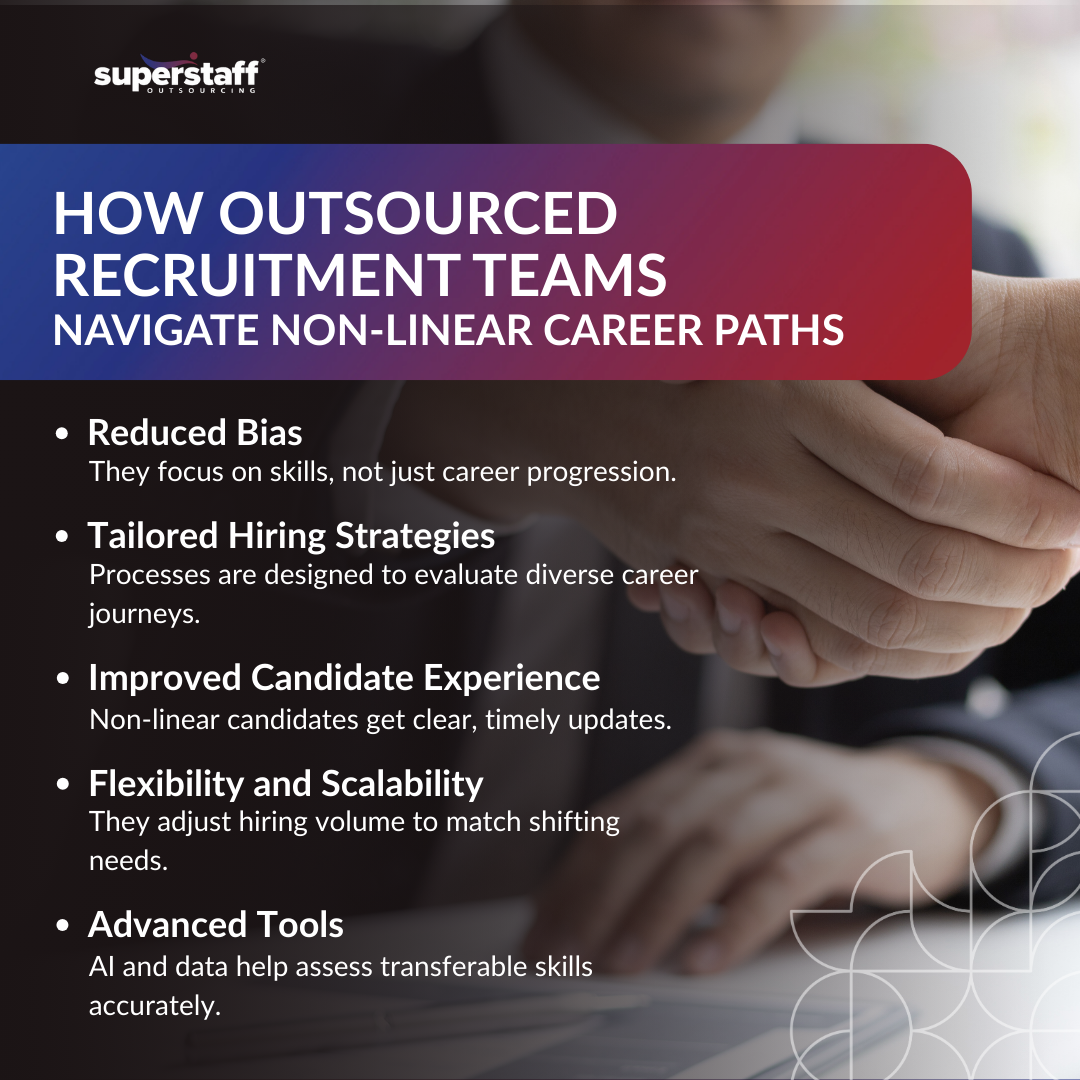
Traditional career ladders are fading—today’s workforce increasingly embraces diverse, non-linear career paths. Are your recruitment strategies keeping pace?
From switching industries mid-career to alternating between freelance and full-time roles, professionals today are redefining what it means to build a career. This shift is driven by evolving workplace values, a growing emphasis on transferable skills, and a new generation prioritizing purpose, flexibility, and lifelong learning over rigid progression. As these non-linear journeys become the norm, businesses must rethink how they identify and engage top talent.
Outsourced recruitment teams are uniquely positioned to help. With access to broader talent pools, market insights, and adaptable hiring strategies, these teams offer the flexibility and expertise to align hiring processes with modern career dynamics.
This article explores how the rise of non-linear career paths reshapes the workforce and how outsourced recruitment teams can help businesses stay ahead of the curve.
Understanding Non-Linear Career Paths
Non-linear careers, characterized by varied roles, industries, and experiences, reflect changing worker priorities and workplace dynamics. A non-linear career path deviates from the traditional “climb-the-ladder” model, where individuals gradually rise through clearly defined roles within one field or organization. Instead, these career paths include lateral moves, industry switches, sabbaticals, entrepreneurial ventures, freelance work, or a return to education mid-career.
- Work-life balance and passion pursuit: Many professionals today prioritize personal well-being and meaningful work over conventional job titles and salary progression.
- Adaptability: In a rapidly changing economy, workers seek career agility. The ability to pivot between industries and roles is now seen as a strength rather than a red flag.
- Generational perspectives: Millennials and Gen Z are driving this trend. Millennials often prioritize autonomy and purpose, while Gen Z seeks variety and continuous growth in their professional lives.
Recognizing this shift is critical for recruitment effectiveness.
The Rise of Non-Linear Careers
An increasing number of professionals are intentionally choosing non-linear career trajectories. A recent FlexJobs report indicates that nearly 7 in 10 workers have changed or considered changing careers in the past year, highlighting a significant reevaluation of career paths among professionals.
- Changing perceptions of success: Career success is no longer strictly tied to promotions or tenure. Today, it can mean pursuing side hustles, engaging in community work, or starting a passion-driven business.
- Remote work and the gig economy: The rise of remote roles and freelance platforms has empowered professionals to chart more flexible career paths.
- Value of transferable skills: Organizations recognize that problem-solving, communication, and adaptability often outweigh years of experience in one narrow field.
This evolution poses unique challenges for businesses, creating a need to cater recruiting for career changers.
Recruitment Challenges of Non-Linear Career Paths
Non-linear career paths complicate traditional recruitment processes, creating new hurdles for HR teams. Many internal recruitment processes are still geared toward evaluating linear resumes, where clear progression and tenure in a single role or company are viewed positively.
- Bias toward linear progression: Recruiters may unconsciously favor candidates with traditional backgrounds, overlooking those with diverse experiences.
- Evaluating transferable skills: Translating unconventional job histories into measurable competencies that align with specific roles can be challenging.
- Complexity in sourcing and screening: Candidates with non-linear careers often don’t fit neatly into job description checkboxes, requiring more nuanced assessment methods.
These challenges highlight the need for innovative recruitment strategies for diverse career journeys. This is where outsourced recruitment teams can come in handy.

Why Outsourced Recruitment Teams Are Essential for Hiring Employees With Varied Career Paths
Through recruitment process outsourcing, businesses can access specialized skills needed to navigate non-linear career complexities. Outsourced recruitment teams offer deep expertise in sourcing, screening, and placing talent with unconventional backgrounds. Their external vantage point allows them to bring objectivity and innovation to hiring practices, which is especially valuable when dealing with candidates whose resumes don’t follow traditional trajectories.
- Flexibility in hiring: One of the key advantages of outsourced recruitment is scalability. Whether a business is experiencing a hiring surge, seasonal fluctuations, or shifting departmental needs, outsourced recruiters can quickly ramp hiring efforts up or down. This adaptability is crucial when managing a workforce with increasingly diverse experiences and employment expectations.
- Tailored recruitment strategies: Unlike internal teams that may rely on standardized processes, outsourced recruiters are highly skilled at developing customized hiring strategies. They can craft job descriptions, screening rubrics, and interview formats that reflect the realities of non-linear career paths. This ensures that unique experiences—like freelance gigs, career pivots, or sabbaticals—are evaluated fairly and strategically.
- Advanced tools and methods: Many outsourced recruitment firms invest in cutting-edge technologies to optimize talent acquisition. From AI-powered resume parsing that identifies hidden skills to behavioral analytics that gauge cultural fit, these tools allow recruiters to look beyond job titles and years of experience. They also apply predictive analytics based on past behaviors and competencies to determine candidate success.
By leveraging flexible capacity, strategic customization, and modern hiring technologies, outsourced recruitment teams turn hiring challenges into competitive advantages. They enable companies to better understand and access the value of talent with varied, non-traditional paths, ensuring the right fit for both the role and the future of the organization.
Effectively Assessing Transferable Skills
Outsourced recruiters excel at identifying and assessing transferable skills that traditional recruiters might overlook. Instead of fixating on job titles or industries, outsourced recruiters focus on underlying competencies and core skills, which are often highly applicable across different contexts.
- Competency-based assessments: These evaluations focus on a candidate’s ability to perform key tasks regardless of previous roles.
- Behavioral interviews: By exploring past behavior in diverse scenarios, recruiters can predict future performance in a new environment.
- Customized skills mapping: Advanced techniques allow outsourced teams to match candidate strengths to job requirements, even across industries.
Accurate skill assessments significantly enhance hiring outcomes.
Enhancing Candidate Experience Through Outsourcing
Outsourcing improves candidate experience, particularly critical for engaging non-linear career professionals. Non-linear candidates often require a more nuanced, empathetic recruitment experience. Outsourced teams specialize in crafting personalized and efficient hiring journeys.
- Streamlined processes: Outsourced recruitment teams prioritize quick, transparent communication to reduce candidate drop-off.
- Employer branding: A thoughtful approach to diverse career paths strengthens employer appeal to a broader talent pool.
- Candidate communication: Regular feedback and clear expectations create a positive experience, increasing the likelihood of offer acceptance.
Strong candidate experiences build employer attractiveness.
Outsourced Recruitment Teams: Your Bridge to a More Flexible, Modern Workforce
As the workforce embraces non-linear career paths, businesses must change recruitment practices to remain competitive. Outsourced recruitment teams provide the adaptability, expertise, and tools needed to do just that.
We explored what defines non-linear careers, why they’re on the rise, the recruitment challenges they present, and how outsourced recruiters provide practical, scalable solutions—from assessing transferable skills to enhancing the candidate experience.
SuperStaff’s recruitment process outsourcing (RPO) solutions are built to meet the demands of a workforce in transition. With flexible, data-driven strategies and a deep understanding of global talent dynamics, we help companies identify and engage top-tier candidates across diverse career paths.
If your business is ready to tap into the full potential of today’s diverse talent landscape, partner with outsourced recruitment teams like SuperStaff—experts who understand the evolving workforce and can help you find the right fit, no matter how unconventional their journey.






